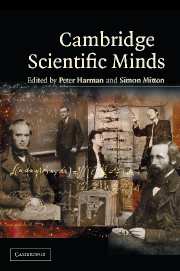Book contents
- Frontmatter
- Contents
- Foreword
- Introduction
- 1 William Gilbert
- 2 William Harvey
- 3 Isaac Newton: Creator of the Cambridge scientific tradition
- 4 William Whewell: A Cambridge historian and philosopher of science
- 5 Adam Sedgwick: A confident mind in turmoil
- 6 Charles Babbage: Science and reform
- 7 Charles Darwin
- 8 Stokes and Kelvin, Cambridge and Glasgow, light and heat
- 9 James Clerk Maxwell
- 10 The duo from Trinity: A.N. Whitehead and Bertrand Russell on the foundations of mathematics, 1895–1925
- 11 Thomson, Rutherford and atomic physics at the Cavendish
- 12 Hopkins and biochemistry
- 13 Charles Sherrington, E.D. Adrian, and Henry Dale: The Cambridge Physiological Laboratory and the physiology of the nervous system
- 14 Hardy and Littlewood
- 15 Arthur Stanley Eddington
- 16 Paul Dirac: A quantum genius
- 17 Alan Turing
- 18 Francis Crick and James Watson
- 19 Mary Cartwright
- 20 Joseph Needham
- 21 Molecular biology in Cambridge
- 22 The discovery of pulsars – prelude and aftermath
- 23 Stephen W. Hawking
1 - William Gilbert
Published online by Cambridge University Press: 05 June 2014
- Frontmatter
- Contents
- Foreword
- Introduction
- 1 William Gilbert
- 2 William Harvey
- 3 Isaac Newton: Creator of the Cambridge scientific tradition
- 4 William Whewell: A Cambridge historian and philosopher of science
- 5 Adam Sedgwick: A confident mind in turmoil
- 6 Charles Babbage: Science and reform
- 7 Charles Darwin
- 8 Stokes and Kelvin, Cambridge and Glasgow, light and heat
- 9 James Clerk Maxwell
- 10 The duo from Trinity: A.N. Whitehead and Bertrand Russell on the foundations of mathematics, 1895–1925
- 11 Thomson, Rutherford and atomic physics at the Cavendish
- 12 Hopkins and biochemistry
- 13 Charles Sherrington, E.D. Adrian, and Henry Dale: The Cambridge Physiological Laboratory and the physiology of the nervous system
- 14 Hardy and Littlewood
- 15 Arthur Stanley Eddington
- 16 Paul Dirac: A quantum genius
- 17 Alan Turing
- 18 Francis Crick and James Watson
- 19 Mary Cartwright
- 20 Joseph Needham
- 21 Molecular biology in Cambridge
- 22 The discovery of pulsars – prelude and aftermath
- 23 Stephen W. Hawking
Summary
As for the causes of magnetic movements, referred to in the schools of philosophers to the four elements and to prime qualities, these we leave for roaches and moths to prey upon.
Gilbert, De Magnete, Book II, Chapter 3.The reputation of William Gilbert (1544–1603) as a great scientific mind traditionally rests on three foundations, all of which are evident in the only book he published, the seminal De Magnete [On the Loadstone] (London, 1600). First, he discovered that the Earth was a giant magnet and, in order to establish the fact, inaugurated the modern science of magnetism. Secondly, he rightly boasted that the method evident in De Magnete was experimental, a radical break with the more textual methods used by his scholastic contemporaries. Finally, he distinguished between magnetism and electricity, which had hitherto been paired as similar, occult attractive principles; he even coined the noun electricitas, which was rapidly Anglicised as ‘electricity’. Gilbert has been made a hero as ‘the first experimental scientist’, and he would come first, chronologically, in many surveys of scientific minds, not just of Cambridge minds. In Cambridge, he is immortalised in the name of Gilbert Road, a development built on land belonging to his college, St John's. As a Cambridge schoolboy, I entered my primary school every day from Gilbert Road, regrettably ignorant of the existence of the eponymous scientific hero.
Nevertheless, Gilbert's inclusion in this collection is probably the most controversial.
- Type
- Chapter
- Information
- Cambridge Scientific Minds , pp. 6 - 20Publisher: Cambridge University PressPrint publication year: 2002
- 5
- Cited by



